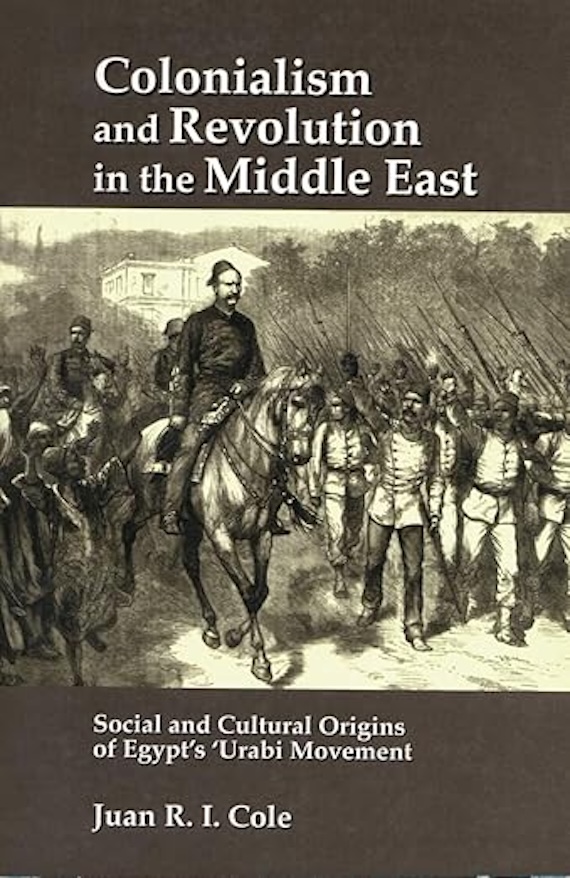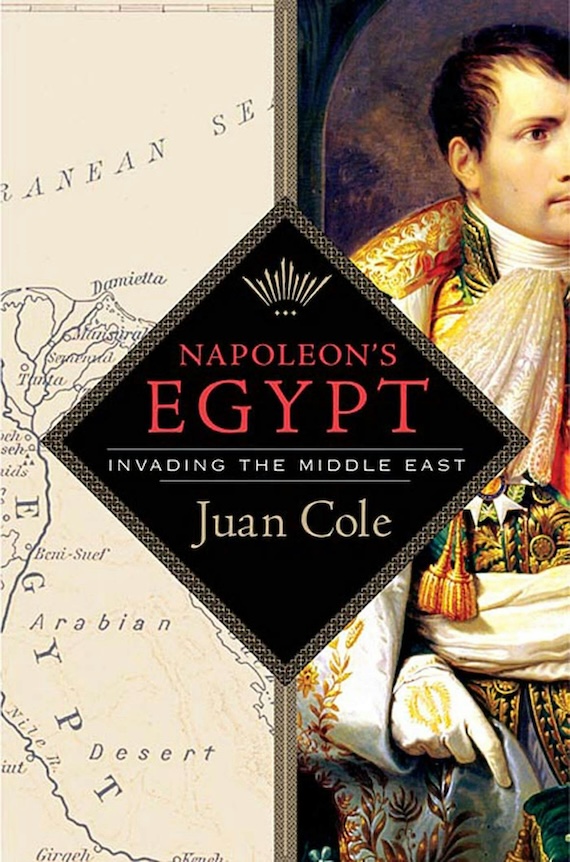Ann Arbor (Informed Comment) – AFP reports that Trump has said, “American ships, both military and commercial, should be allowed to travel, free of charge, through the Panama and Suez canals!” He went on to allege that “both routes” would not exist in the first place without the United States.
News organizations have probably lost track of the tens of thousands of lies Trump has told while in office. As far as I can tell, most of the things that come out of the addled old lunatic’s mouth are either lies or falsehoods.
As a historian, I particularly mind the lies and falsehoods about history. And as a historian of Egypt, I particularly mind lies and falsehoods about Egyptian history.
I wrote a book about Egyptians’ attempt, in 1882, to overthrow their government, in part for being a puppet of the British imperial authorities, which had bought the Suez Canal for a song in 1876. The British invaded to stage a counter-revolution.

Juan Cole, Colonialism & Revolution In the Middle East: Social and Cultural Origins of Egypt’s ‘Urabi Movement. Princeton University Press, 1993. Click here to buy an e-book. (See the AHR review here.)
So, as you might imagine, the United States had nothing at all to do with the building of the Suez Canal.
Interest in a canal from the Red Sea to the Mediterranean was expressed in the ancient world, but the only practical waterways that were dug connected the Egyptian Delta to the Red Sea. The Pharaohs undertook such works, as did Darius I of Iran, which ruled Egypt 525-404 BCE.
Never miss an issue of Informed Comment: Click here to subscribe to our email newsletter! Social media will pretend let you subscribe but then use algorithms to suppress the postings and show you their ads instead. And please, if you see an essay you like, paste it into an email and share with friends.
The first practical modern survey toward a Suez canal was conducted by the French after Gen. Napoleon Bonaparte invaded and occupied Ottoman Egypt, an occupation that lasted 1798-1801.
If it helps establish my credibility versus Mr. Trump on Egyptian history, I also wrote a book about Bonaparte in Egypt (which is affordable and, I’m told, very entertaining):
Juan Cole, Napoleon’s Egypt. Click here to buy.
The French were expelled from Egypt by an alliance of the Ottoman Empire and the British Empire in 1801. One of the Ottoman officers leading that effort, Mehmet Ali (Muhammad Ali in Arabic) managed to make himself viceroy, and to establish a hereditary dynasty ruling an Ottoman vassal state there.
In France, the Saint-Simonian movement of utopian socialists had an interest in uniting the entire globe through vast engineering works. Before Marx, they envisioned a state-led economy. Like today’s Silicon Valley, they thought scientists and engineers should rule. They developed a special interest in seeing a Suez Canal built. One of their leaders, Prosper Enfantin, came to Egypt in the 1830s to try to convince Mehmet Ali to build a canal, but could not pique the viceroy’s (or “Khedive’s”) interest. Enfantin was later involved in French colonialism in Algeria, and served as a director of the Lyon Railway. The Saint-Simonians had a fetish of large-scale transportation infrastructure. Another Saint-Simonian working in Mehmet Ali’s government, Charles-Joseph Lambert, did serious studies toward a canal. He forwarded them to Linant de Bellefonds, who had a higher position with the khedivial government, and who added to them.
Ferdinand de Lesseps was also in Egypt in this era and became a tutor to Mehmet Ali’s son Said, after which he returned to Francce. Said came to power as viceroy or Khedive in 1854, and de Lesseps returned to Cairo to try to convince him to build a Suez Canal, which he did. Said Pasha was a modernist and something of a secularist, and also had the first Egyptian railway built. The canal was built with Egyptian labor, some of it forced labor (corvee) ordered by the Khedive, and working-class Egyptian lives were lost in the project.
Donald Trump would later come along and take credit for this Franco-Egyptian project executed by Egyptian laborers.
The Suez Canal was completed in 1869, under Said’s successor, Khedive Ismail. Ismail held a huge international bash to celebrate the opening and commissioned Giuseppe Verdi (d. 1901) to write the opera Aida, which was performed first in the new Cairo Opera House. We are told that the opera’s “scenario was provided by Auguste Mariette, the French Egyptologist and founder of the Egyptian Museum of Cairo, although its fundamental love-triangle structure is common to many operatic plots.”
The Orientalist Bernard Lewis would later allege that no Arab capital had a symphony orchestra, even though one regularly played at the venerable Opera House in Cairo built to celebrate the opening of the canal.
Ismail Pasha (r. 1863-1879) was also a modernizer. He once said, “Egypt is no longer Africa. We are part of Europe.” He initially benefited from the global Cotton Boom caused by the North’s blockade of the US South during the Civil War. Egypt had a valued indigenous strain of long-staple cotton. Ismail borrowed heavily to expand cotton cultivation and extend the railway, and built other infrastructure. But European banks took him to the cleaners with high Mafia-like interest and extra fees, and Egypt became heavily indebted to European banks and bondholders. The end of the Civil War brought a lot of cotton on the world market and prices plummeted, making debt servicing all the more difficult. Egypt became the most indebted country in the world per capita. In 1876 Ismail was forced to sell the Suez Canal to the British Empire for a fraction of its value, to pay off some of those loans, contracted at exorbitant rates. In 1882 the country revolted against European informal imperialism, but the British invaded, using a mix of British and Indian troops, and colonized Egypt 1882-1922. London wanted control of the Suez Canal and of Egypt because the canal was the shortest and cheapest route between Britain and the jewel in the crown of the Empire, India.
By the early 1950s, Egypt was technically independent of Britain, but the British still owned the canal. Egyptians rioted over this remnant of colonialism in 1952, and Egyptian police and British troops traded fire. In 1952, young officers made a coup. On July 26, 1956, Egyptian President Gamal Abdel Nasser, who had come to power after the coup, nationalized the canal.
The British responded by conspiring with the French and the Israelis to retake the Suez Canal. The French were trying to repress the Algerian Revolution, and hated Abdel Nasser’s popular brand of Arab nationalism and anti-colonialism. Israel coveted the Sinai Peninsula for its Greater Israel project. The three launched their conspiracy and went to war late in October, 1956. They did not let President Ike Eisenhower know about their plans, though. He figured out the conspiracy and was furious, because they could have cost him the presidential election against Adlai Stevenson by making him look out of touch and not in control of world affairs.
Eisenhower ordered the three right back out of Egypt, threatening to call in US loans and crash their economies. He appears to have used some salty language known only to an old soldier in some of those phone calls with naughty heads of state. Eisenhower believed that the 1956 Suez War was a grave threat to the post-World War II United Nations order in which aggressive warfare and conquest of neighbors’ land was outlawed. He also feared that French and British attempts to retain their colonial empires would drive the Egyptians and Algerians into the arms of the Communists, as had already happened in Vietnam. He thought they could instead be brought into the capitalist order.
So the only thing the United States has had to do with the Suez Canal has been to preserve Egypt’s claim to it as a key pillar of the post-War world in which nation states are secure in their national assets.
And now the shabby old Apricot Adolf wants to undo Eisenhower’s accomplishments as vanquisher of fascism and upholder of a post-conquest world order to strong-arm Egypt into giving up some of its Suez Canal tolls. At about $16 billion a year, they are one of five major sources of Egypt’s income, and it is a desperately poor country.
Of course, with another four years of Donald Trump at the helm, the U.S. may become a desperately poor country, too, and maybe Egypt will give us some charity.



 © 2025 All Rights Reserved
© 2025 All Rights Reserved